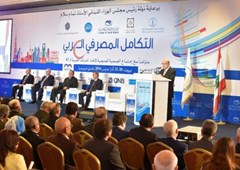Speech
Dr. Joseph Torbey
Chairman of the World Union of Arab Bankers
Chairman of the UAB Executive Committee
The US-MENA PSD 2016
“De-Risking and Correspondent Banking”
April 18, 2016
NYFED NYC-USA
Excellences,
Distinguished guests,
Ladies and Gentlemen,
It is a great pleasure and honor for me to welcome you all to the sixth US-MENA PSD Conference, titled this year “De-risking and Correspondent Banking”, and which assembles as usual distinguished speakers and guests from the public and private sectors in the U.S. and the MENA region.
I am indeed pleased to see this large gathering of colleagues from the U.S. and the Arab banking sectors, in addition to government officials and central bank governors.
I would like also to thank our partners in organizing this event, particularly the Federal Reserve Bank of New York, as well as other U.S. and Arab institutions and organizations.
Ladies and Gentlemen,
Throughout the US MENA PSD gatherings since 2006, we remained committed to keeping this public-private sector dialogue initiative active, which represents a platform for banks and financial institutions on one hand, and the government official, central bankers, and bank regulators and supervisors on the other, to meet and exchange concerns and information. This open dialogue is crucial for the development and protection of the banking and financial system.
Over the past few years, banks and financial institutions have been facing increasing levels of regulatory and supervisory requirements, with particular focus on anti-money laundering and counter-financing of terrorism. These highly complicated and demanding regulatory and supervisory frameworks place more burden on banking institutions.
In this environment of unprecedented national and international regulatory pressure, banks and financial institutions are compelled to balance between maintaining high-risk financial relationships, satisfying due diligence requirements, and meeting the rising compliance costs.
While some banks respond to the mounting regulatory requirements by strengthening oversight and monitoring, others prefer to avoid risk, by totally cutting the relationships with “high-risk” clients, particularly when these relationships pose more risk than potential revenues. This has resulted in the emergence of de-risking, which is in fact an extreme reaction to this challenge.
So, rather than adopting more comprehensive KYC and enhanced due diligence frameworks, many banks react by terminating financial relationships with entire groups of customers or businesses considered high risk, particularly under AML/CFT standards.
We did witness a decline number of linkages between banks worldwide in the recent years. In most cases, banks ended the relationships not because they have evidence of misconduct, but simply because the costs of checking on their correspondent banks offset the profits they could generate. This has in fact occurred with several Arab banks.
Another concern resulting from de-risking is its possible negative impact on financial inclusion. When banks decide to de-risk entire categories of customers, decent individuals and legitimate businesses within these groups will be deprived from access to finance. This would certainly force those individuals to seek alternative, and probably more expensive financial services providers or lenders in order to fulfill their banking needs.
Similarly, de-risked businesses might turn to black market transactions to keep their businesses operating.
De-risking may leave some banks, customers and even countries with no or little access to the global financial system. That, in turn, may exacerbate poverty and unemployment. Thus, de-risking poses challenges for financial inclusion, since it limits access to formal banking services for customers who may not be able to meet some requirements. This also results in developing shadow banking at the expense of regulated banking.
Banks in the Arab region (like many other banks in developing countries) could face a dilemma due to their fear of de-risking. On one hand, they have to boost their lending business sometimes considered risky particularly in terms of compliance requirements, and on the other hand, they are required to keep adopting the international compliance laws and regulations.
A conflict has emerged between combating financial crime and other public policy objectives such as financial inclusion, creating employment, facilitating trade and investment, and promoting competition. A robust, effective and strict regulatory and supervisory framework is certainly required, but equal importance should be dedicated to other priorities relating to growth and sustainability.
And as long as some global banks continue to believe that the easiest way to manage their exposures with some other banks is by closing accounts and relationships deemed high risk, de-risking will increase, which in turn will affect the flow of remittances to poor families in developing countries, and more broadly, financial inclusion.
Ladies and Gentlemen,
I wish that during this conference, we will be able to assess the extent of de-risking, and its impact on correspondent banking and financial inclusion, and more importantly, come up with recommendations that balance between the need to comply with regulatory and supervisory requirements and standards, and the necessity to boost our financial relationships and promote financial inclusion.
To conclude, we consider that it is our honor and mission as bankers and finance professionals to take appropriate measures to make our financial sector entirely inclusive, playing the role of the engine of growth to help economically fragile individuals develop and be more resilient to shocks. In so doing, we participate to the fight against unemployment and poverty which are the main sources of crimes ravaging our societies. We would also be contributing to the social and human well-being in our countries, by walking the path that leads to Empowerment, Opportunity, Economic growth and Stability.
I wish our conference all the success and thank you for your attentive listening.
